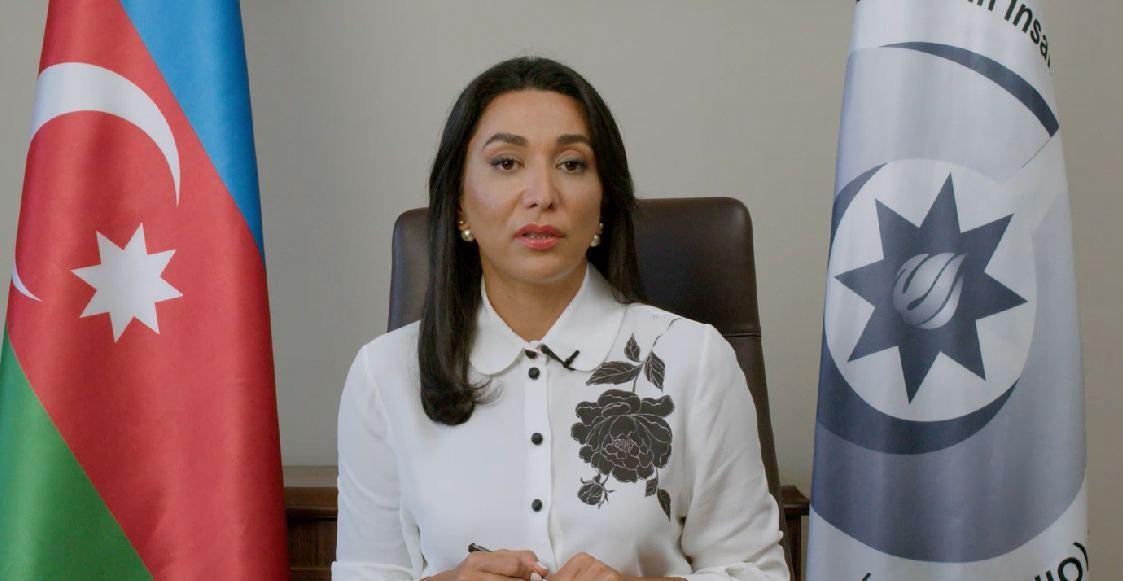Ombudsman urges int'l condemnation of Armenian war crimes

By Ayya Lmahamad
Azerbaijan’s Human Rights Commissioner (Ombudsman) Sabina Aliyeva has called the world community and international organizations to strongly condemn Armenian war crimes and gross violations of international law, the ombudsman office reported on its website on October 4.
In a statement on the anniversary of casualties and destructions caused by the shelling of Ganja city and other areas of Azerbaijan by Armenian armed forces, Aliyeva said:
"On the eve of the anniversary of those events, which resulted in numerous casualties and are tragic not only for the people of Azerbaijan but also for humanity, once again appealing to the world community and international organizations, I call on them to strongly condemn war crimes accompanied by gross violations of international law, as well as of IHL and resulted in the killing of civilians, and to push for decisive steps to bring the Armenian military-political leadership to justice.”
She recalled that on October 4, 2020, starting from early hours, Armenian armed forces attacked from the prohibited munitions Ganja city, the second-largest and densely populated city located far from the former conflict zone.
Aliyeva emphasized that on this day, Mingachevir city, where the largest hydroelectric power station and war reservoir are located, as well as Khizi and Absheron, which were located far away from the area of active hostilities, were also chosen by Armenia as a target.
The ombudsman added that the Armenian armed forces deliberately and in a targeted manner shelled the populous settlements in Beylagan, Tartar cities, Fuzuli’s Horadiz city, Barda, Aghdam, Aghjabedi, Jabrayil and other densely populated civilian objects from the heavy artillery and missiles.
“As a consequence, there were many killed and wounded among the peaceful population; civilian objects, historic monuments and cultural property, administrative buildings, and other social objects were heavily damaged,” the statement read.
She noted that on-site investigations were conducted after those attacks and the findings have been documented and addressed to the international community as a report.
The statement stressed that Armenia perpetrated war crimes once again showing disrespect for international law, while IHL requires distinguishing between combatants and civilians, civilian and military objectives during the hostilities.
“Unfortunately, I would like to note that the military-political leadership of Armenia, which committed war crimes in gross violation of the norms and principles of international law, has not yet been held accountable and prosecuted for serious crimes,” the ombudsman stressed.
She underlined that the lack of serious measures to prevent the war crimes committed by aggressor Armenia and to punish the perpetrators by the influential international organizations and international courts has led to new crimes against humanity.
The Azerbaijani Foreign Ministry tweeted about the anniversary of Armenia's shelling of Ganja
"Today a year has passed since Armenia grossly violated all principles of humanitarian law by attacking the Ganja city, the civilian settlements located beyond the conflict zone. Remembering the innocent victims with sorrow and pain!"
Starting from October 4, 2020, at 10:00 (GMT+4) Armenian armed units deliberately targeted the civilian population of Azerbaijan by subjecting the country's second-largest city- Ganja, which is not relevant to the region where the hostilities took place. Ganja came under rocket fire on October 4, 5, 8, 11 and 17. As a result of this horrific terrorist attack, 26 people were killed and 175 were injured. Civilian infrastructure and vehicles suffered enormous damage.
A Moscow-brokered ceasefire deal that Baku and Yerevan signed on November 10, 2020, brought an end to six weeks of fighting between Armenia and Azerbaijan. The Azerbaijani army declared a victory against the Armenian troops. The signed agreement obliged Armenia to withdraw its troops from the Azerbaijani lands that it has occupied since the early 1990s.
The peace agreement stipulated the return of Azerbaijan's Armenian-occupied Kalbajar, Aghdam and Lachin regions and urged Armenia to withdraw its troops from the Azerbaijani lands that it has occupied since the early 1990s. Before the signing of the deal, the Azerbaijani army had liberated around 300 villages, settlements, city centers, and historic Shusha city.
--
Ayya Lmahamad is AzerNews’ staff journalist, follow her on Twitter: @AyyaLmahamad
Follow us on Twitter @AzerNewsAz
Here we are to serve you with news right now. It does not cost much, but worth your attention.
Choose to support open, independent, quality journalism and subscribe on a monthly basis.
By subscribing to our online newspaper, you can have full digital access to all news, analysis, and much more.
You can also follow AzerNEWS on Twitter @AzerNewsAz or Facebook @AzerNewsNewspaper
Thank you!
